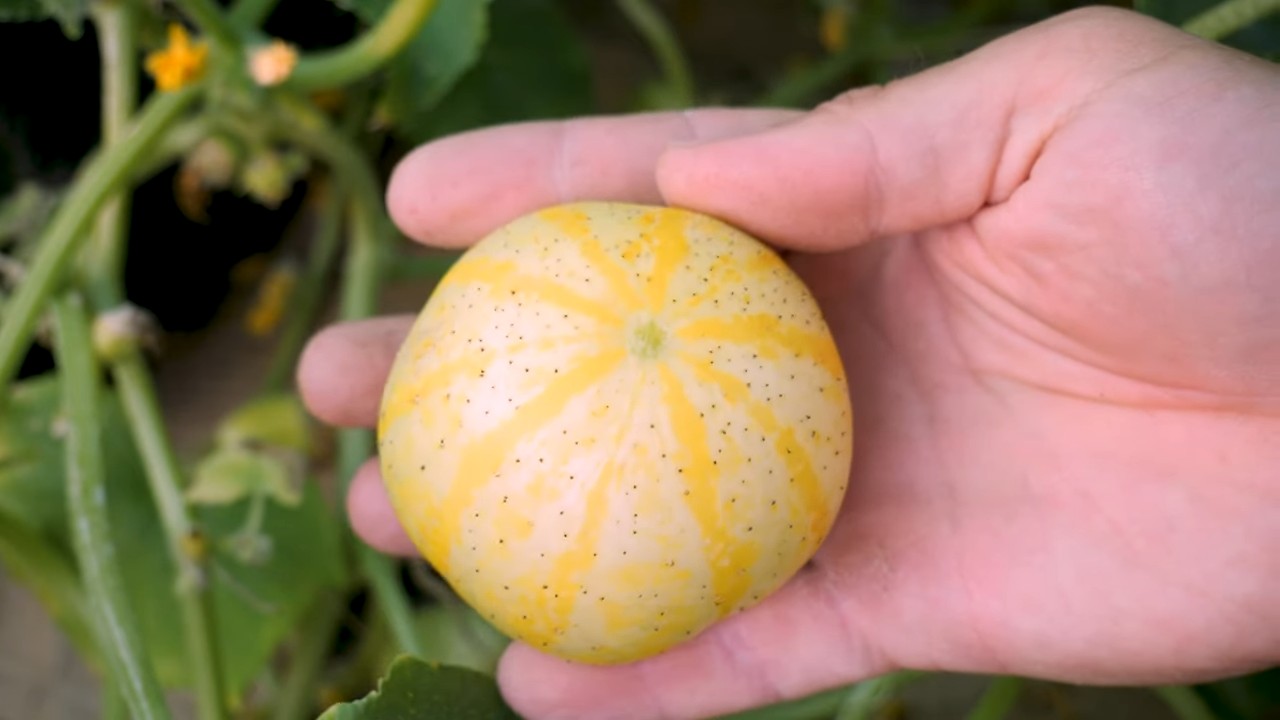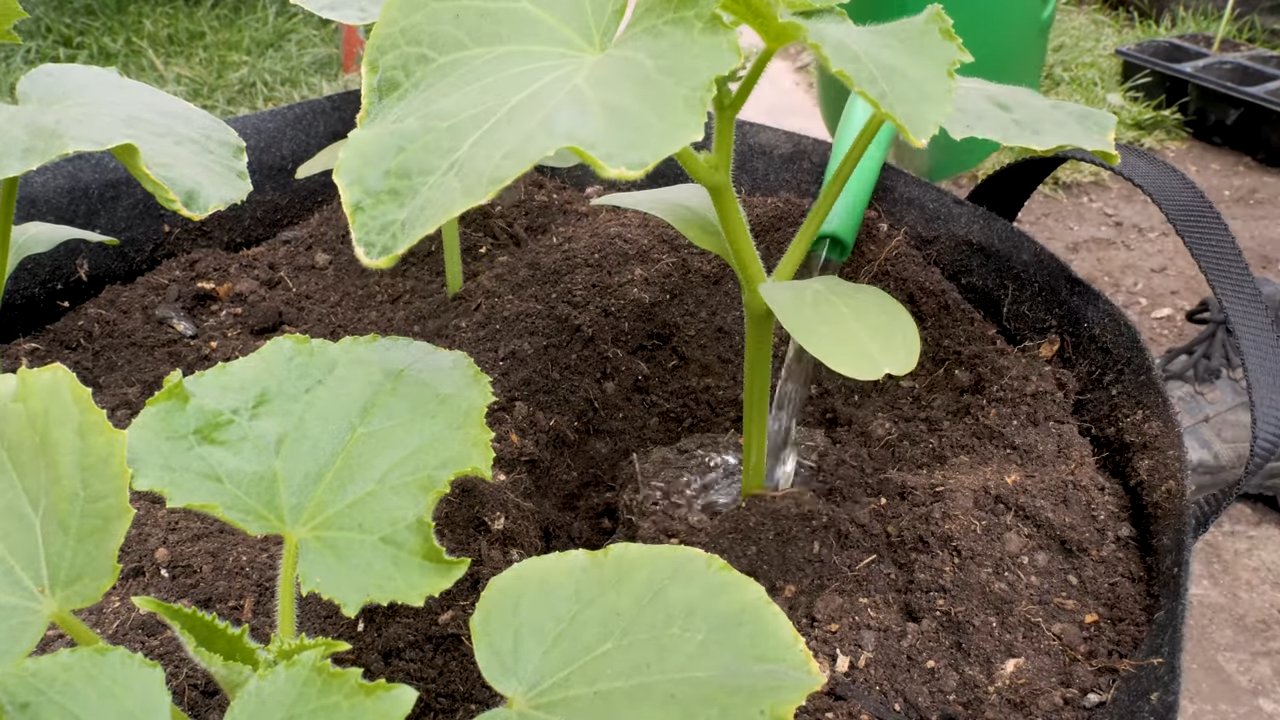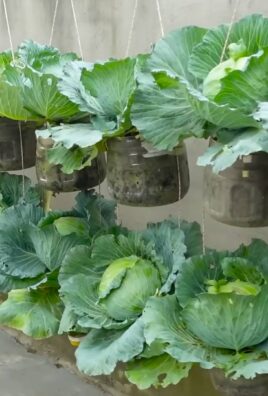Grow Lemon Cucumbers and transform your garden into a whimsical, productive paradise! Have you ever seen a cucumber that looks like a lemon? These delightful, sunshine-yellow orbs are not only visually stunning but also boast a crisp, mild flavor that’s perfect for salads, snacking, and pickling. Forget the same old boring cucumbers; let’s embark on a journey to cultivate these unique gems right in your own backyard!
While the exact origins of the Lemon Cucumber are a bit hazy, they’ve been around for quite some time, adding a touch of novelty to gardens for generations. Their unusual appearance often sparks curiosity and conversation, making them a fantastic conversation starter and a fun project for gardeners of all ages. I remember the first time I saw one – I was instantly captivated!
Why should you bother with this DIY project? Well, for starters, growing your own Lemon Cucumbers is incredibly rewarding. You’ll have access to fresh, organic produce right at your fingertips. More importantly, it’s a fantastic way to reduce your reliance on store-bought vegetables, save money, and connect with nature. Plus, who wouldn’t want to impress their friends and family with these quirky, delicious cucumbers? I’m going to show you some simple, effective tricks and hacks to ensure you have a bountiful harvest of these sunny delights. Let’s get started and grow Lemon Cucumbers like a pro!

Growing Lemon Cucumbers: A Fun and Fruity DIY Project!
Hey there, fellow gardening enthusiasts! Ever heard of lemon cucumbers? They’re these adorable, round cucumbers that look like lemons and have a mild, slightly sweet flavor. I’ve been growing them for a few years now, and let me tell you, they’re a real conversation starter and a delicious addition to salads and snacks. Plus, they’re surprisingly easy to grow yourself! So, if you’re looking for a fun and rewarding DIY gardening project, stick with me, and I’ll walk you through everything you need to know to grow your own lemon cucumbers.
What You’ll Need
Before we dive into the nitty-gritty, let’s gather our supplies. Here’s a list of everything you’ll need to successfully grow lemon cucumbers:
* Lemon Cucumber Seeds: Obviously! You can find these online or at most garden centers. Make sure you’re getting seeds specifically for lemon cucumbers, not just regular cucumbers.
* Starting Trays or Small Pots: These are for starting your seeds indoors. I prefer using peat pots because they’re biodegradable and you can plant the whole pot directly into the ground, minimizing root disturbance.
* Seed Starting Mix: This is a special soil mix designed for starting seeds. It’s lighter and more nutrient-rich than regular potting soil.
* Larger Pots (Optional): If you’re planning on growing your lemon cucumbers in containers, you’ll need larger pots (at least 5 gallons) for transplanting.
* Garden Soil: If you’re planting directly in the ground, you’ll need to amend your garden soil with compost or other organic matter.
* Compost or Aged Manure: This will enrich your soil and provide essential nutrients for your lemon cucumber plants.
* Fertilizer: A balanced fertilizer (like 10-10-10) will help your plants grow strong and produce lots of cucumbers.
* Trellis or Support System: Lemon cucumber vines can get quite long, so you’ll need a trellis or other support system to keep them off the ground.
* Watering Can or Hose: For watering your plants, of course!
* Gardening Gloves: To protect your hands.
* Hand Trowel: For planting and transplanting.
* Pruning Shears: For trimming and pruning your plants.
Starting Your Seeds Indoors (Optional)
Starting your seeds indoors gives you a head start on the growing season, especially if you live in a cooler climate. I usually start my seeds about 4-6 weeks before the last expected frost.
1. Prepare Your Seed Starting Trays: Fill your seed starting trays or small pots with seed starting mix. Gently press down on the soil to remove any air pockets.
2. Sow the Seeds: Plant 2-3 lemon cucumber seeds per pot, about ½ inch deep.
3. Water Gently: Water the soil gently with a watering can or spray bottle until it’s moist but not soggy.
4. Provide Warmth and Light: Place the trays in a warm location (around 70-75°F) and provide plenty of light. A sunny windowsill or a grow light will work well.
5. Keep the Soil Moist: Keep the soil consistently moist, but avoid overwatering.
6. Thin Seedlings (If Necessary): Once the seedlings emerge (usually within 7-10 days), thin them out, leaving only the strongest seedling in each pot.
Preparing Your Garden Bed or Containers
Whether you’re planting your lemon cucumbers in the ground or in containers, it’s important to prepare the soil properly.
1. Choose a Sunny Location: Lemon cucumbers need at least 6-8 hours of sunlight per day. Choose a location in your garden that gets plenty of sun.
2. Amend the Soil: If you’re planting in the ground, amend the soil with compost or aged manure. This will improve drainage, fertility, and overall soil health.
3. Prepare Containers: If you’re planting in containers, choose pots that are at least 5 gallons in size. Fill the pots with a high-quality potting mix.
4. Install Trellis or Support System: Before planting, install a trellis or other support system for your lemon cucumber vines to climb on. This will help keep the fruits off the ground and prevent them from rotting.
Transplanting Your Seedlings or Direct Sowing
Once the danger of frost has passed and the soil has warmed up, it’s time to transplant your seedlings or direct sow your seeds.
1. Harden Off Seedlings (If Transplanting): If you started your seeds indoors, you’ll need to harden them off before transplanting them outdoors. This means gradually exposing them to outdoor conditions over a period of 7-10 days. Start by placing them in a sheltered location for a few hours each day, gradually increasing the amount of time they spend outdoors.
2. Plant Seedlings or Sow Seeds: Dig a hole that’s slightly larger than the root ball of your seedling or sow seeds directly into the ground, about ½ inch deep. Space plants about 18-24 inches apart.
3. Water Thoroughly: Water the plants thoroughly after planting.
4. Mulch Around Plants: Apply a layer of mulch around the plants to help retain moisture, suppress weeds, and regulate soil temperature.
Caring for Your Lemon Cucumber Plants
Now that your lemon cucumber plants are in the ground, it’s time to provide them with the care they need to thrive.
1. Water Regularly: Lemon cucumbers need consistent moisture, especially during hot, dry weather. Water deeply and regularly, aiming for about 1 inch of water per week.
2. Fertilize Regularly: Fertilize your plants every 2-3 weeks with a balanced fertilizer. Follow the instructions on the fertilizer package.
3. Prune as Needed: Prune your lemon cucumber plants to encourage branching and fruit production. Remove any yellowing or dead leaves.
4. Control Pests and Diseases: Keep an eye out for pests and diseases, such as aphids, cucumber beetles, and powdery mildew. Treat any problems promptly with appropriate organic or chemical controls. I personally prefer using neem oil for pest control.
5. Train Vines to Trellis: As your lemon cucumber vines grow, train them to climb the trellis or support system. This will help keep the fruits off the ground and prevent them from rotting. I use soft twine to gently tie the vines to the trellis.
Harvesting Your Lemon Cucumbers
The best part! Lemon cucumbers are typically ready to harvest about 50-60 days after planting.
1. Look for the Right Size and Color: Harvest your lemon cucumbers when they are about the size of a lemon and have turned a pale yellow color.
2. Harvest Regularly: Harvest your lemon cucumbers regularly to encourage continued fruit production.
3. Use Pruning Shears: Use pruning shears to cut the cucumbers from the vine, leaving a small stem attached.
4. Enjoy Your Harvest: Lemon cucumbers are delicious eaten fresh, pickled, or added to salads. They have a mild, slightly sweet flavor that’s perfect for summer.
Troubleshooting
Even with the best care, you might encounter some problems while growing lemon cucumbers. Here are a few common issues and how to address them:
* Yellowing Leaves: This could be a sign of overwatering, underwatering, nutrient deficiency, or disease. Check the soil moisture and adjust your watering accordingly. Fertilize your plants regularly and treat any diseases promptly.
* Lack of Fruit Production: This could be due to poor pollination, lack of sunlight, or nutrient deficiency. Make sure your plants are getting enough sunlight and fertilize them regularly. You can also try hand-pollinating the flowers by transferring pollen from the male flowers to the female flowers with a small brush.
* Pests and Diseases: Keep an eye out for pests and diseases and treat any problems promptly. Neem oil is a great organic option for controlling many common garden pests.
Extra Tips for Success
Here are a few extra tips to help you grow the best lemon cucumbers possible:
* Succession Planting: Plant a new batch of seeds every few weeks to extend your harvest season.
* Companion Planting: Plant lemon cucumbers with companion plants like marigolds, nasturtiums, and basil to help deter pests and attract pollinators.
* Save Seeds: Save seeds from your best lemon cucumbers to plant next year.
* Enjoy the Process: Gardening should be fun! Don’t be afraid to experiment and learn from your mistakes.
Growing lemon cucumbers is a rewarding experience that anyone can enjoy. With a little bit of planning and effort, you can have a bountiful harvest of these unique and delicious fruits. Happy gardening!

Conclusion
So, there you have it! Growing lemon cucumbers is not just a quirky gardening experiment; it’s a gateway to a more flavorful, visually appealing, and rewarding culinary experience. We’ve explored the simple steps involved, from selecting the right seeds to providing the optimal growing conditions. But why should you actually take the plunge and try this DIY trick?
First and foremost, the taste. Forget the bland, watery cucumbers you find in the grocery store. Lemon cucumbers offer a refreshing, slightly sweet, and subtly citrusy flavor that elevates salads, snacks, and even cocktails. Imagine the delight of biting into a crisp, homegrown lemon cucumber on a hot summer day – a taste sensation you simply can’t replicate with store-bought varieties.
Beyond the taste, consider the visual appeal. These adorable, yellow, ball-shaped cucumbers are a conversation starter. They add a touch of whimsy and charm to your garden and your plate. Imagine serving a salad adorned with these miniature suns – your guests will be impressed!
But perhaps the most compelling reason to grow lemon cucumbers is the sheer satisfaction of nurturing something from seed to harvest. Gardening is a therapeutic activity that connects us to nature and provides a sense of accomplishment. Watching your lemon cucumber plants thrive and produce these unique fruits is an incredibly rewarding experience.
And the possibilities don’t stop there! Feel free to experiment with different growing techniques. Try growing them in containers on your balcony or patio if you have limited space. Explore companion planting to deter pests and enhance growth. Consider trellising your plants to maximize space and improve air circulation.
Variations and Suggestions:
* **Pickling:** Lemon cucumbers make fantastic pickles! Their unique flavor adds a delightful twist to traditional pickle recipes.
* **Salads:** Slice them thinly and add them to your favorite salads for a burst of flavor and color.
* **Snacks:** Enjoy them fresh off the vine as a healthy and refreshing snack.
* **Drinks:** Muddle them into cocktails or infuse them into water for a refreshing twist.
* **Gifting:** Share your bounty with friends and neighbors! Lemon cucumbers make a unique and appreciated gift.
We encourage you to embark on this gardening adventure and discover the joys of growing lemon cucumbers for yourself. Don’t be afraid to experiment, learn from your mistakes, and most importantly, have fun!
Once you’ve harvested your first batch of these delightful fruits, we’d love to hear about your experience. Share your photos, tips, and recipes with us in the comments below. Let’s create a community of lemon cucumber enthusiasts and inspire others to try this rewarding DIY trick! Your insights could help fellow gardeners overcome challenges and achieve success. So, get your hands dirty, embrace the process, and prepare to be amazed by the magic of growing lemon cucumbers. Happy gardening!
Frequently Asked Questions (FAQ)
What exactly are lemon cucumbers? Are they a hybrid of lemons and cucumbers?
No, lemon cucumbers are not a hybrid of lemons and cucumbers. They are a unique variety of cucumber ( *Cucumis sativus* ) that gets its name from its round, yellow appearance and slightly citrusy flavor. They are a distinct cultivar with characteristics that differentiate them from typical green cucumbers. The “lemon” in their name refers to their visual and taste resemblance, not their genetic makeup.
How long does it take to grow lemon cucumbers from seed?
Generally, it takes about 60-70 days from planting the seeds to harvesting mature lemon cucumbers. However, this timeframe can vary depending on factors such as climate, soil conditions, and the specific variety of lemon cucumber you are growing. You can start seeds indoors 4-6 weeks before the last expected frost to get a head start. Once the soil has warmed up and the risk of frost has passed, transplant the seedlings outdoors.
What are the ideal growing conditions for lemon cucumbers?
Lemon cucumbers thrive in warm, sunny locations with well-drained soil. They need at least 6-8 hours of direct sunlight per day. The soil should be rich in organic matter and have a pH between 6.0 and 7.0. Consistent watering is crucial, especially during hot and dry periods. Avoid overhead watering to prevent fungal diseases. Consider adding a layer of mulch around the plants to help retain moisture and suppress weeds.
Are lemon cucumbers susceptible to any pests or diseases?
Like other cucumber varieties, lemon cucumbers can be susceptible to pests such as aphids, cucumber beetles, and squash bugs. Common diseases include powdery mildew, downy mildew, and bacterial wilt. Regularly inspect your plants for signs of pests or diseases. Use organic pest control methods such as insecticidal soap or neem oil to manage infestations. Ensure good air circulation around the plants to prevent fungal diseases. Crop rotation and choosing disease-resistant varieties can also help minimize problems.
How do I know when lemon cucumbers are ripe and ready to harvest?
Lemon cucumbers are typically ready to harvest when they are about the size of a tennis ball and have turned a bright yellow color. The skin should be smooth and firm to the touch. Avoid letting them overripen, as they can become bitter and seedy. Harvest them regularly to encourage continued production. Use a sharp knife or pruning shears to cut the cucumbers from the vine, leaving a short stem attached.
Can I grow lemon cucumbers in containers?
Yes, lemon cucumbers can be successfully grown in containers, making them a great option for gardeners with limited space. Choose a large container (at least 12 inches in diameter) with good drainage. Use a high-quality potting mix that is rich in organic matter. Provide a trellis or other support structure for the vines to climb. Water regularly and fertilize every few weeks with a balanced fertilizer. Place the container in a sunny location that receives at least 6-8 hours of direct sunlight per day.
Do lemon cucumbers need to be pollinated?
Yes, lemon cucumbers require pollination to produce fruit. They have both male and female flowers on the same plant. Pollination is typically done by bees and other insects. If you are growing lemon cucumbers indoors or in an area with limited pollinator activity, you may need to hand-pollinate the flowers. To do this, use a small paintbrush to transfer pollen from the male flowers to the female flowers. Female flowers have a small cucumber-like structure at the base, while male flowers do not.
Are lemon cucumber seeds readily available? Where can I find them?
Yes, lemon cucumber seeds are generally readily available from various sources. You can find them at most garden centers, nurseries, and online seed retailers. Look for reputable seed companies that offer high-quality seeds. You can also save seeds from your own lemon cucumbers to plant the following year, but be aware that the resulting plants may not be true to type if cross-pollination has occurred.
How do I store lemon cucumbers after harvesting?
Lemon cucumbers are best stored in the refrigerator. Place them in a plastic bag or container to prevent them from drying out. They will typically last for about a week in the refrigerator. For longer storage, you can pickle them or ferment them.
What are some creative ways to use lemon cucumbers in recipes?
Lemon cucumbers are incredibly versatile and can be used in a variety of recipes. Here are a few ideas:
* **Salads:** Slice them thinly and add them to salads for a refreshing and slightly sweet flavor.
* **Snacks:** Enjoy them fresh off the vine as a healthy and hydrating snack.
* **Pickles:** Make lemon cucumber pickles for a unique and tangy treat.
* **Gazpacho:** Add them to gazpacho for a refreshing twist.
* **Cocktails:** Muddle them into cocktails or infuse them into water for a citrusy flavor.
* **Relishes:** Use them to make a refreshing cucumber relish.
* **Sandwiches:** Add thin slices to sandwiches for a crunchy and flavorful layer.




Leave a Comment